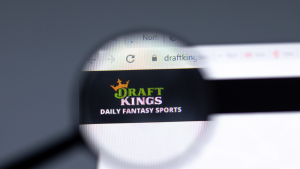It’s certainly no secret that Cathie Wood’s ETFs have struggled mightily for the last 18 months. Many investors are looking at which Cathie Wood stocks to sell.
Her Ark Innovation ETF (NYSEArca:ARKK) has tumbled about 70% from its high set in February 2021, and the financial news media has kept a close eye on it all of these months.
While Wood has completely abandoned some of her worst duds –such as Virgin Galactic (NYSE:SPCE), Palantir (NYSE:PLTR), and Skillz (NYSE:SKLZ) — there are still a number of Cathie Wood stocks to sell.
Some of the worst remaining Cathie Wood stocks are in the crypto space. Cryptos have proven to be worthless as a hedge against inflation. Multiple crypto exchanges have had trouble staying solvent, jeopardizing their customers’ ability to withdraw their remaining funds. The latter situation, of course, has greatly undermined consumers’ trust in cryptos.
These are three Cathie Wood Stocks to sell as soon as possible.
| Robinhood | HOOD | $9.41 |
| Coinbase | COIN | $75.27 |
| DraftKings | DKNG | $14.28 |
Robinhood (HOOD)

In my Dec. 9 column on Robinhood (NASDAQ:HOOD) stock, I theorized that the company, which had obtained “almost 15% of its sales” from cryptos in the third quarter of 2021, may be caught in a vicious cycle.
The cycle consisted of millennials selling cryptos, causing the value of cryptos to drop and resulting in more millennials selling their cryptos. That cycle, I believed, would cause the number of millennials buying and selling cryptos to sink, hurting Robinhood’s results.
Additionally, I believed that Robinhood would be undermined by increased competition because more and more brokerages were enabling their customers to buy and sell cryptos.
Robinhood’s earnings have indeed tumbled, although they’ve doubtlessly been undermined by the stock market’s weakness as well as by the massive retreat of cryptos.
In the first quarter, the company’s EBITDA, excluding certain items, came in at -$143 million versus an adjusted EBITDA profit of $115 million during the same period a year earlier. Meanwhile, its net revenues tumbled 43% year over year and its monthly user base fell 8% during Q1.
A sizeable portion of the retail investors who abandoned the platform won’t return, and cryptos are likely to continue plunging, making HOOD stock a sell.
Coinbase (COIN)

Coinbase (NASDAQ:COIN) is facing many of the same woes as Robinhood.
However, since the company described itself as “a secure online platform for buying, selling, transferring, and storing cryptocurrency,” it’s safe to assume that all or nearly all of the company’s revenue comes from cryptos.
Therefore, COIN stock is likely to take much more of a hit from the ongoing crypto winter, which will only get worse over the longer term.
Multiple analysts and large investors are also very bearish on COIN stock. For example, Jim Chanos, who has shorted COIN stock, said in early June that ““Coinbase was not a call on crypto prices. It was a call on what we thought was a sort of ancillary predatory business model.”
He predicted that the company’s fees would continue to sink amid rising competition. And Goldman Sachs on June 27 slashed its rating on COIN stock to “sell” from “neutral.” Goldman warned that “current crypto asset levels and trading volumes imply further degradation in COIN’s revenue base, which we see falling ~61% {YOY) in 2022, and ~73% in the back half of the year.”
DraftKings (DKNG)

As I stated in a prior article on DKNG stock, the company has tough competition that’s severely undermining its profitability.
Indeed, there were more than 45 legal, online sports betting operators in the U.S. Compounding DraftKings’ problem, unlike some of its competitors, it does not own any brick-and-mortar casinos.
As a result, DraftKings does not have as many existing customers that it can target as its brick-and-mortar competitors. Given the tough competition in the online betting sector and DraftKings’ lack of a large, existing customer base, it has had to spend a tremendous amount of money on sales and marketing.
In Q1, for example, its sales and marketing costs jumped to $321.45 million, versus $228.7 million during the same period a year earlier. Meanwhile, its loss per share jumped to $1.14 from 87 cents.
On the date of publication, Larry Ramer did not have (either directly or indirectly) any positions in the securities mentioned in this article. The opinions expressed in this article are those of the writer, subject to the InvestorPlace.com Publishing Guidelines.
